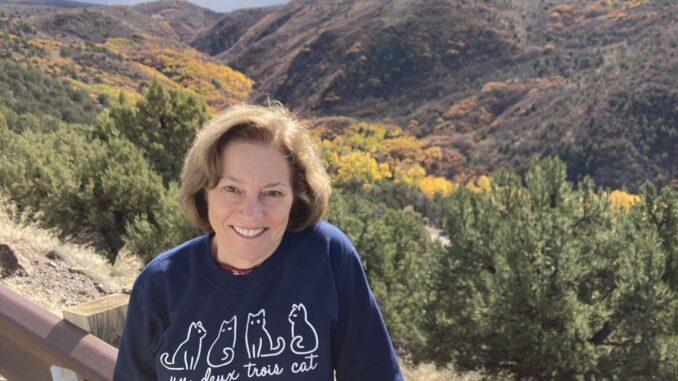
Alyssa VanPelt, Staff Writer
The Monday before election day, November 4th, 2024, SUNY Oneonta, with the support of the history department, held an open discussion regarding the role of the free press within the modern world. SUNY Oneonta is currently working on a project called the “American Democracy” project. The purpose of this project is to try to enliven college campuses to increase democratic engagement & civil involvement.
It is the American Democracy project that has compelled faculty to invite Debra Bruno. Bruno spent the majority of her career as a journalist. The farthest her career in journalism dates back would be during her time as a student at SUNY Oneonta where she worked within The State Times. It was not until five or six years ago, according to Bruno, that she stepped away from journalism and began writing books. She is the author of A Hudson Valley Reckoning which discusses her family’s historical background as slaveholders as well as the importance of talking about these dark pasts. It is her willingness to handle difficult subjects and her experience in journalism that makes Bruno an excellent choice to lead a conversation on the role of the media & press in a democratic society.
The first question asked was, “How do you think the press is handling this current election season?” Bruno’s first response was to acknowledge the complexity of that question as many things are working against the press such as people distrusting the news, so it has become quite unnerving. She shares how the Washington Post, since being bought by Jeff Bezos, did not endorse a candidate. This has unfortunately caused many people to cancel their subscriptions to the Washington Post because they relied on them to support a candidate. The Washington Post is moving into a bipartisan stance on politics as they may be aiming to be a more neutral and unbiased news source. It is acknowledged later in the discussion by one of the other professors present that the press used to be biased. Newspapers were printed by specific organizations to promote and share their ideologies, so it is more of a modern concept for the news to want to present themselves as bipartisan.
Bruno was very curious about how the audience at the event received their news, processed their news, and what they did with that information. It was not very surprising that, as the audience mostly consisted of Gen Z, they either received their news through social media platforms like Instagram or they did not consume news. It became understood that the audience wanted to be informed, but there is so much information and disinformation being shared throughout all forms of news, that it has become overwhelming to keep up. This could be the result of being a student with full-time obligations to their studies, or an understanding that there is too much negativity being shared. As a generation who receives most of their news through social media, it is very easy to become swept away by rage baits or devasting stories. Unfortunately, social media will continue to share the same type of content as people continue to interact with it, so many people may avoid specific content altogether and social media may remain a form of escapism.
Bruno gave recommendations on how to be a “good digital citizen” when getting news. She suggests receiving the same news through multiple sources so readers can hear different perspectives as well as all of the details. Additionally, receiving news from multiple sources, allows people to fact-check the information they read on social media. Finally, not to repost anything that readers do not know if it is true to end the spread of misinformation. Bruno is such an insightful woman, and it was a pleasure to hear her input on the current news climate of American society.
Leave a Reply